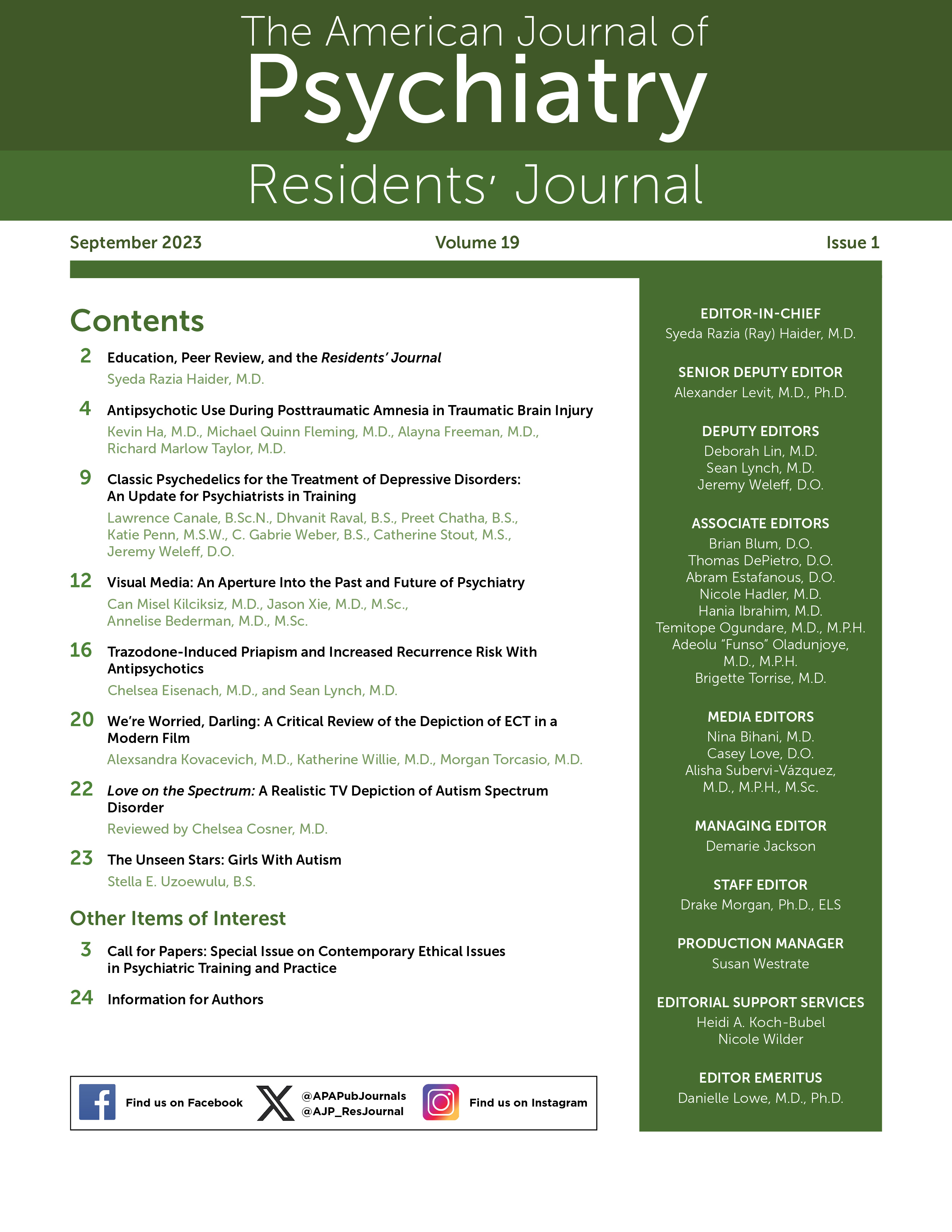Love on the Spectrum (
1) is a Netflix reality TV series that follows the relationships and dating experiences of young adults with autism living in Australia. The desires that the people on this reality TV series express are common ones: wanting love, companionship, and to have a family. I would recommend this show to all people working in psychiatry as a nuanced depiction of autism spectrum disorder (ASD), because it allows viewers to gain perspective about ASD, though it still has limitations in its portrayals of autism.
To meet the ASD diagnostic criteria in DSM-5, there must be aspects of persistent social deficits and restricted, repetitive patterns of behavior or interests (
2). Most fictional shows featuring autistic people, such as
Hannibal or
The Good Doctor, depict heterosexual white male protagonists, often with savant skills. One fictional show,
Atypical, shows a more realistic portrayal of ASD. This series, similar to
Love on the Spectrum, follows young autistic people and their friends as they navigate issues with school and relationships.
Love on the Spectrum goes even further in capturing the diversity of autistic people by focusing on true stories of young autistic adults.
In portraying real autistic people, the show includes depictions of women, people with physical disabilities, and LGBTQIA+ people. Olivia, one of the show’s stars, laments what it is like for her to be autistic, stating, “there’s no girl [ASD] criteria; there’s only boy [criteria], so you get assessed by how male you are.” There is no explicit difference in the DSM criteria for males or females; however, more men than women are diagnosed with ASD, with a ratio of four men for every one woman diagnosed (
2,
3). This may be due to an underdiagnosis of ASD among women or ASD not being diagnosed among women until later in life (
3). Neurodivergent people are also more likely than neurotypical people to identify as nonheterosexual and gender diverse (
4). In describing her sexuality, Chloe, another participant on the show, says, “I’m openly bi[sexual] … it’s just … I’m trying to find the right person.”
Another cast member, Mark, exhibits a diagnostic feature of ASD in his fixated interest in dinosaurs, which appears off-putting to his date when he spends most of their outing talking about dinosaur facts. He says that he is trying to work on his social skills, identifying it as a “huge challenge.” Mark says, “Even though I’m on the spectrum, I’m still capable of falling in love and being a compassionate and caring person.”
Mark is later seen participating in the Program for the Education and Enrichment of Relational Skills (PEERS)—a social skills training and “dating boot camp” for autistic people led by Dr. Elizabeth Laugeson—in the hopes of improving some of his dating skills. In a randomized controlled trial, Dr. Laugeson has shown lasting improvements in social skills among autistic adults who have participated in PEERS (
5).
Love on the Spectrum ran two seasons in Australia, with both seasons available in the United States. The second season continues to expose audiences to positive, realistic depictions of autistic people. However, the series would benefit from depicting a more racially, sexually, and gender-diverse cast to better represent the autistic community. The series also has limitations in that it does not depict autistic people who are non-speaking, nor does it show those with intellectual and developmental disabilities or other co-occurring mental health conditions.
Reality TV can often be unrealistic. Compared with previous series, Love on the Spectrum gives a more accurate, though still limited, depiction of ASD. Shows that focus on the whole person and a variety of experiences allow viewers to unlearn stereotypes of what it means to be autistic and see how we all desire love and companionship.
